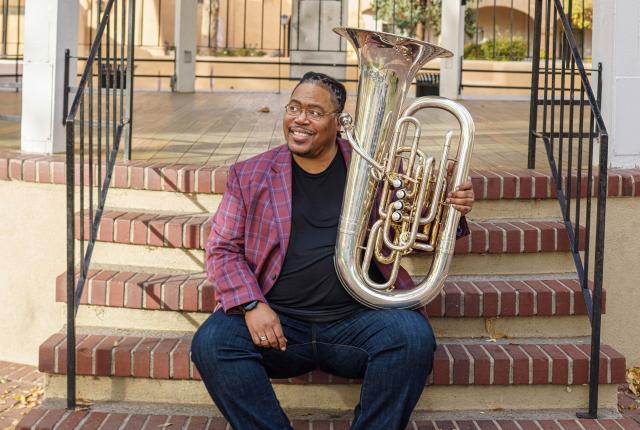A BAG OF FRIED CHICKEN GIZZARDS BOUGHT WITH COINS plucked from a gutter, some relatives to play games with, and a meetup with his wandering, alcoholic mother at the end of the day. Those were the keys to Richard Antoine White’s survival as a homeless child in Baltimore—until the night a fierce blizzard hit the city and he couldn’t find his mom, nor a warm place to sleep. His new foster parents set him on a path toward becoming the first Black brass player to earn a doctorate in music for tuba performance. White tells his story in a new memoir, I’m Possible: A Story of Survival, a Tuba, and the Small Miracle of a Big Dream (Flatiron), and in a short documentary, Hi I’m Richard Antoine White. Serving as principal tubist for both the New Mexico Philharmonic and the Santa Fe Symphony, he mentors a new generation as professor of tuba/euphonium at the University of New Mexico.
I was born with an extraordinary imagination, which saved my life. I had to imagine a warm blanket, imagine a full tummy.
Living on the streets, my activities on the daily consisted of playing, like any normal kid. But unfortunately, it also included me finding something to eat for that day, and oftentimes trying to find my mom to reconnect.
I couldn’t find my mother the night of the blizzard. To me, it seemed like I was banging like Hercules on the doors of my family members. But considering there was a snowstorm, they probably didn’t even hear me. I just got exhausted, and I crawled into a vestibule and fell asleep. The next morning, I woke up. The authorities were there. They called my [eventual] foster parents, and the rest is history.
As time went on, I discovered two things. One, it’s astonishing how little it takes to change someone’s life, like my foster parents did. And two, this is not a story of tragedy. This is a triumphant story of a village coming together to help a young man.
The hero in all of this is my mom, because she was smart enough to give me up so that I could have a better life.
That snowstorm ultimately was the catalyst to what I consider the American dream.
I had a lot in common with the tuba. We were both bulky, big, both underdogs, underrepresented in music. It just resonated with me.
We all have the same goal when we play music. Never once have I thought, Wow, I’m the only Black person onstage, before I play my first note.
How do we get more representation? We give everyone the same resources as the most privileged people—the quality instruments, the quality instruction—and we allow them to compete at the level of excellence. Never should we lower the bar.
Once someone gives you the gift of integrity and lets you know that they respect you, you never really want to lose it. It’s a driving force for me.
I am definitely a motivator. I’ll be in your lesson going, “Go, shorty, it’s your birthday, get busy, you can do it.” Or I might sing the Rocky song.
Everyone said, “Fool, you can’t play Santa Fe Opera.” I said, “I’m gonna call ’em up.” And I did just that. So for my first years here, I played in not only the New Mexico Symphony Orchestra, but the Santa Fe Opera.
There’s something very special about building something from the ground up. And that’s what I feel like the people of New Mexico do.
See for yourself
Read Richard Antoine White’s memoir I’m Possible, and hear him with the New Mexico Philharmonic or the Santa Fe Symphony.


